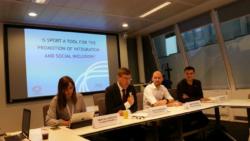European Commission Sport Unit’s first policy breakfast of 2020
On February 3rd the Sport Unit of the European Commission organised and hosted its first policy breakfast on the use of sport for social inclusion and integration.
‘Can sport be a tool for social inclusion and integration?’ was the central theme given to 2020’s first edition of policy events. While the problematic may seem like an obvious statement to stakeholders of the sport sector it is worth bearing in mind that sport and physical activities are not necessarily quintessential mediums to foster and boost social inclusion and integration.
From empirical experience, Wim Poelmans of the Flemish Athletics League (Vlaamse Atletiekliga- Belgium) is convinced in the power sport can have to foster social inclusion as is demonstrated from the three projects he showcased. BVAC- Antwerp, Les Gazelles de Bruxelles, and Atlemo – Molenbeek (Brussels) have all been established to focus on specific social groups (refugees, ethnic minorities, individuals from disadvantaged backgrounds and individuals with disabilities) in the context of a rapidly changing Belgian society. Vlaamse Atletiekliga is furthering the sharing of their experience and knowledge by participating in European wide projects such as ASPIRE and SPIRIT projects leg by ENGSO.
The head organisation of sport in the region of Hessen (Germany), Sportjugend Hessen, was represented by Volker Rehm. Thanks to Sportjugend, Hessen region is very active when it comes to socially including refugees through, a mission that is notably achieved by focusing and investing in sport coaches. The latter follow a mandatory training each year as they act as the main mediator between the target group, sport movement, social organisation and public institutions.
Sport and Citizenship think tank welcomed the choice of topic for 2020’s first policy breakfast as it reflects its present and future relevance in European societies, as is further mirrored in our FIRE project (Football Including Refugees in Europe).











 MEMBERSHIP
MEMBERSHIP CONTACT
CONTACT FACEBOOK
FACEBOOK